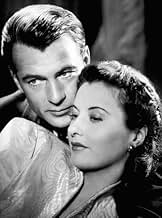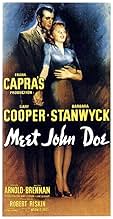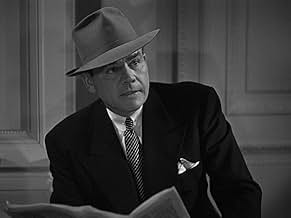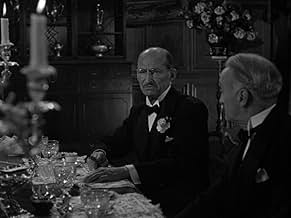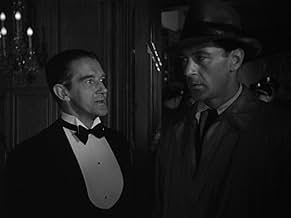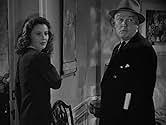CALIFICACIÓN DE IMDb
7.6/10
16 k
TU CALIFICACIÓN
Un vagabundo sin un centavo es reclutado por un columnista ambicioso para hacerse pasar por una persona inexistente que dijo que se suicidaría como protesta, y comienza un movimiento polític... Leer todoUn vagabundo sin un centavo es reclutado por un columnista ambicioso para hacerse pasar por una persona inexistente que dijo que se suicidaría como protesta, y comienza un movimiento político.Un vagabundo sin un centavo es reclutado por un columnista ambicioso para hacerse pasar por una persona inexistente que dijo que se suicidaría como protesta, y comienza un movimiento político.
- Dirección
- Guionistas
- Elenco
- Nominado a 1 premio Óscar
- 4 premios ganados y 1 nominación en total
Charles C. Wilson
- Charlie Dawson
- (as Charles Wilson)
Opiniones destacadas
There's an Italianate "cinema verite" in Capra's work, perhaps genetic . . . I find this film so powerful, and its characters so sympathetic, that I can hardly watch the riot scene. It's almost too terrifying.
Cooper's performance at first seems wooden, but he's an actor whom you need to watch, like a pond, to see the emotions swimming beneath the surface. Barbara Stanwyck is one of my favorite actresses--she never makes a false move and is beautiful to watch from any angle.
I find some lines of dialogue chilling in this age of Patriot Acts I and II and corporate globalism/global corporatism: "The American people need an iron hand," declares D. B. Norton, whose sneer looks like Cheney's.
Cooper's performance at first seems wooden, but he's an actor whom you need to watch, like a pond, to see the emotions swimming beneath the surface. Barbara Stanwyck is one of my favorite actresses--she never makes a false move and is beautiful to watch from any angle.
I find some lines of dialogue chilling in this age of Patriot Acts I and II and corporate globalism/global corporatism: "The American people need an iron hand," declares D. B. Norton, whose sneer looks like Cheney's.
10hienai
This film is a classic example of a movie working effortlessly on a range of different layers. Capra weaves his well-loved everyman through a tale of both simplicity and political intrigue, taking in the American depression and Biblical references along the way, and comes up with messages that remain startlingly relevant today, over six decades after this movie's release.
Gary Cooper delivers a masterful performance, and in keeping with the film, achieves this with a deceptively easy touch. He is supported by a peerless cast which includes Barbara Stanwyck and Walter Brennan, both on top form.
Perhaps most impressive is the illustration of Capra's democratic ideal by including the views of the audience throughout the story. You can find all your views being voiced by different characters at various points in the tale, opening the question of just who is the average everyman that Capra is seeking to show? - and how do they relate to you?
This movie is ten stars all over. Even for keen Capra fans, the expectation is surpassed by the final delivery. Thoroughly recommended.
Gary Cooper delivers a masterful performance, and in keeping with the film, achieves this with a deceptively easy touch. He is supported by a peerless cast which includes Barbara Stanwyck and Walter Brennan, both on top form.
Perhaps most impressive is the illustration of Capra's democratic ideal by including the views of the audience throughout the story. You can find all your views being voiced by different characters at various points in the tale, opening the question of just who is the average everyman that Capra is seeking to show? - and how do they relate to you?
This movie is ten stars all over. Even for keen Capra fans, the expectation is surpassed by the final delivery. Thoroughly recommended.
After doing Mr Deeds Goes To Town and Mr Smith Goes To Washington for Columbia, Capra quit and made this third film about an average Joe thrust into a powerful world where exploitation is high on the agenda, but in true Capra style the story unfolds to a customary flip flop triumph.
Ann Mitchell is a struggling journalist who gets fired from her newspaper job by new editor Henry Connell, by way of venting her frustrations she writes in her stinging last article about a man called John Doe who is tired of being pushed around and held back by the big bosses, she finishes the piece by claiming that Doe will commit suicide on Christmas Eve by leaping off the roof of city hall, the public react to the letter with tremendous heart and Doe becomes a champion of the people.
After Connell gets interested in the letter Ann has to confess that she made it up, they hatch a plan to turn a real unemployed drop out into John Doe so as to continue the story and sell more papers, and of course Ann gets to keep her job. This brings in ex minor league pitcher Long John Willoughby, who is down on his luck and very short of cash, and this is when the story shifts from amiable comedy on to a much darker path, the result making for a riveting watch.
Whilst not being up with the best Capra films in his armoury, it is, however, one of his smartest. The portrayal of the human spirit in many guises is stark and poignant, whilst thematically Capra got his point over about the unsavoury elements blossoming in America. The cast are nailed on watchable, Gary Cooper is John Doe, the right amount of sympathy and guts is garnered from his performance, and in one rousing speech he has the viewers in the palm of his hand. Barbara Stanwyck is Ann Mitchell and she delivers a great turn that calls for a number of emotions to be performed convincingly, while the support cast are all solid with the stand out a bizarrely unnerving Edward Arnold as D B. Norton; a man wishing to be a dictator if ever there was one. 10/10
Ann Mitchell is a struggling journalist who gets fired from her newspaper job by new editor Henry Connell, by way of venting her frustrations she writes in her stinging last article about a man called John Doe who is tired of being pushed around and held back by the big bosses, she finishes the piece by claiming that Doe will commit suicide on Christmas Eve by leaping off the roof of city hall, the public react to the letter with tremendous heart and Doe becomes a champion of the people.
After Connell gets interested in the letter Ann has to confess that she made it up, they hatch a plan to turn a real unemployed drop out into John Doe so as to continue the story and sell more papers, and of course Ann gets to keep her job. This brings in ex minor league pitcher Long John Willoughby, who is down on his luck and very short of cash, and this is when the story shifts from amiable comedy on to a much darker path, the result making for a riveting watch.
Whilst not being up with the best Capra films in his armoury, it is, however, one of his smartest. The portrayal of the human spirit in many guises is stark and poignant, whilst thematically Capra got his point over about the unsavoury elements blossoming in America. The cast are nailed on watchable, Gary Cooper is John Doe, the right amount of sympathy and guts is garnered from his performance, and in one rousing speech he has the viewers in the palm of his hand. Barbara Stanwyck is Ann Mitchell and she delivers a great turn that calls for a number of emotions to be performed convincingly, while the support cast are all solid with the stand out a bizarrely unnerving Edward Arnold as D B. Norton; a man wishing to be a dictator if ever there was one. 10/10
About 15 or twenty years ago MEET JOHN DOE aired on a saturday matinee program on the CBC. I watched it and absolutely loved it. In the ensuing two decades I have Studied Film History and the art of film making. I have debated Film Theory and criticisum with some of the country's most film-smart people and have worked extensively in the film industry. And very rarely through all of this was Meet John Doe mentioned. The other day I saw A copy of the film in a used video store, remembered it from my youth and promptly bought it. And after viewing it again I have to say it is definetly one of the finest motion-pictures I have ever seen. It has to be one of the most under-rated movies ever made. The social commentary exhibeted is one of the boldest that the medium has ever presented, especially considering the time it was made. A time when media propaganda was a driving force for home-shore morale at the beginning of WWII. Capra and langs techniques in this work are absoloutly astounding. The riot scene should be looked upon as ground breaking. The performances (both the lead and supporting) are among some of the finest and most endearing of the time. Needless to say I'm going to be toot this films horn for quite some time. (I think I'll go watch it again.)
10B&W-2
This film offers a standing rebuke to critics who use the term "Capracorn". None of Capra's films are as blindly optimistic as is often argued, but this one is a pitch-black jeremiad against manipulation by the media. The mob scene at the "John Doe" convention is one of the powerful scenes ever filmed. Stanwyck is incredible as reporter Anne Mitchell. She is one of the great actresses of the century, and she always did her best work Capra, whose female characters are generally more compelling to the women we get in the movies of our "liberated" era. Cooper is fantastic as a truly "average" guy who is "awakened" by his experience with the John Doe movement, and Edward Arnold is absolutely terrifying in the role of Fascist D.B. Norton. This film is even more relevant today than when it was made, and I would argue that it should be viewed in high schools across the continent. Capra is asking his viewers to think critically of EVERYTHING they hear on the radio or see in papers or hear from elites, and amen to that!
¿Sabías que…?
- TriviaDirector Frank Capra didn't want anyone to play John Doe except Gary Cooper, who agreed to the part without reading a script for two reasons: he had enjoyed working with Capra on El secreto de vivir (1936), and he wanted to work with Barbara Stanwyck.
- ErroresAfter "John Doe" intrudes on D. B. Norton's dinner party and tells him off, Norton calls his newspaper and orders a special edition which will reveal Doe as a fraud. Doe takes a cab from Norton's house directly to the convention hall. Within minutes of his arrival there, a horde of newsboys appear with copies of the newspaper. It would be impossible to print an extra edition in such a short period of time. Correction: There isn't a plot hole, because D.B. Norton isn't saying nor implying that the newspaper will be printed from them on. He stated, before Ann is running after John Doe's in the Rain, "that he was prepared for this" and this does imply that the papers were already prepared, printed before. D.B. was a very rich man, callous, evil man. He foresaw all the problems in his investments.
- Versiones alternativasAlso available in a computer-colorized version.
- ConexionesFeatured in The 54th Annual Academy Awards (1982)
- Bandas sonorasTHE BATTLE HYMN OF THE REPUBLIC
(1861) (uncredited)
Music by William Steffe
Lyrics by Julia Ward Howe
Performed by Hall Johnson Choir
Selecciones populares
Inicia sesión para calificar y agrega a la lista de videos para obtener recomendaciones personalizadas
- How long is Meet John Doe?Con tecnología de Alexa
Detalles
- Fecha de lanzamiento
- País de origen
- Idioma
- También se conoce como
- Meet John Doe
- Locaciones de filmación
- Productora
- Ver más créditos de la compañía en IMDbPro
- Tiempo de ejecución2 horas 15 minutos
- Color
- Relación de aspecto
- 1.37 : 1
Contribuir a esta página
Sugiere una edición o agrega el contenido que falta


